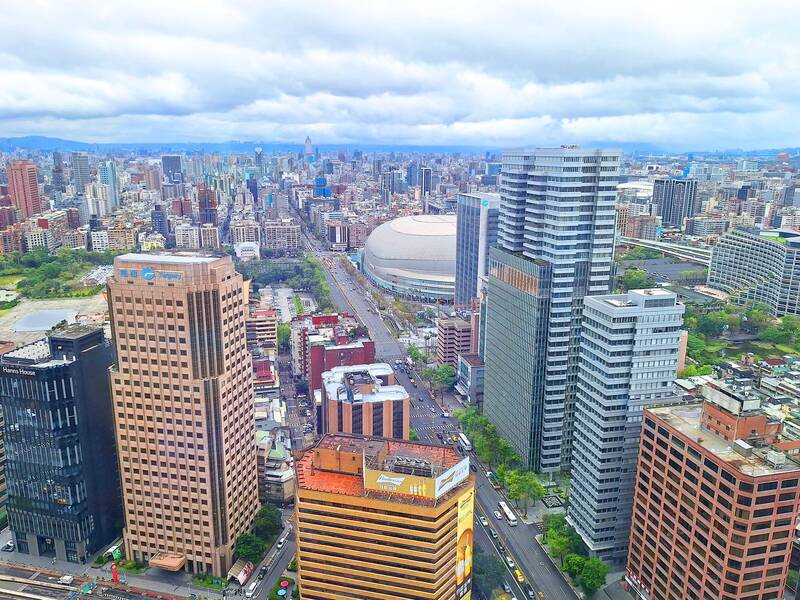The central bank plans to use inspections of lenders’ mortgage operations to replace credit controls in the cooling domestic housing market, as current tightening measures have proven effective, Governor Yang Chin-long (楊金龍) said at a meeting of the legislature’s Finance Committee in Taipei yesterday.
When asked by lawmakers if the central bank would replace fresh credit controls with financial inspections in moderating real estate lending, Yang answered “of course.”
His remarks came as the central bank is to hold its quarterly board meeting on Thursday next week, with the market closely watching its interest rate decisions and potential new housing credit controls.

Photo: CNA
As US President Donald Trump’s tariff hikes cast unfavorable shadow over the landscape ahead, Yang said the central bank’s board directors would have the final say on interest rate decisions and credit control measures after factoring in inflation and inflation expectations, major global central banks’ monetary policy and economic and financial conditions at home and abroad.
The central bank conducted 170 special inspections between 2021 and last year, and would press ahead with the practice to make sure lenders stand by their planned schedule in slowing real estate lending, which approached a record high in the summer last year, Yang said.
The central bank tightened its credit controls on local lenders in September last year as the property market heated up. Since then, most banks have met their self-imposed targets regarding housing loan restrictions, Yang said.
However, a few fell short and would be required to provide explanations and improvement measures, Yang said, adding that the central bank would supply legislators with data on the laggards.
Home loan restrictions effectively help calm house price increase expectations, prioritize homebuyers with real demand and reduce banks’ exposure to real estate loans, the governor said.
As a result, the concentration of real estate loans in banks’ portfolios has gradually declined, Yang said.
However, the central bank would review its credit controls dynamically as the market evolves, he said.

UNCERTAINTY: Innolux activated a stringent supply chain management mechanism, as it did during the COVID-19 pandemic, to ensure optimal inventory levels for customers Flat-panel display makers AUO Corp (友達) and Innolux Corp (群創) yesterday said that about 12 to 20 percent of their display business is at risk of potential US tariffs and that they would relocate production or shipment destinations to mitigate the levies’ effects. US tariffs would have a direct impact of US$200 million on AUO’s revenue, company chairman Paul Peng (彭雙浪) told reporters on the sidelines of the Touch Taiwan trade show in Taipei yesterday. That would make up about 12 percent of the company’s overall revenue. To cope with the tariff uncertainty, AUO plans to allocate its production to manufacturing facilities in

Taiwan will prioritize the development of silicon photonics by taking advantage of its strength in the semiconductor industry to build another shield to protect the local economy, National Development Council (NDC) Minister Paul Liu (劉鏡清) said yesterday. Speaking at a meeting of the legislature’s Economics Committee, Liu said Taiwan already has the artificial intelligence (AI) industry as a shield, after the semiconductor industry, to safeguard the country, and is looking at new unique fields to build more economic shields. While Taiwan will further strengthen its existing shields, over the longer term, the country is determined to focus on such potential segments as

TAKING STOCK: A Taiwanese cookware firm in Vietnam urged customers to assess inventory or place orders early so shipments can reach the US while tariffs are paused Taiwanese businesses in Vietnam are exploring alternatives after the White House imposed a 46 percent import duty on Vietnamese goods, following US President Donald Trump’s announcement of “reciprocal” tariffs on the US’ trading partners. Lo Shih-liang (羅世良), chairman of Brico Industry Co (裕茂工業), a Taiwanese company that manufactures cast iron cookware and stove components in Vietnam, said that more than 40 percent of his business was tied to the US market, describing the constant US policy shifts as an emotional roller coaster. “I work during the day and stay up all night watching the news. I’ve been following US news until 3am

COLLABORATION: Given Taiwan’s key position in global supply chains, the US firm is discussing strategies with local partners and clients to deal with global uncertainties Advanced Micro Devices Inc (AMD) yesterday said it is meeting with local ecosystem partners, including Taiwan Semiconductor Manufacturing Co (TSMC, 台積電), to discuss strategies, including long-term manufacturing, to navigate uncertainties such as US tariffs, as Taiwan occupies an important position in global supply chains. AMD chief executive officer Lisa Su (蘇姿丰) told reporters that Taiwan is an important part of the chip designer’s ecosystem and she is discussing with partners and customers in Taiwan to forge strong collaborations on different areas during this critical period. AMD has just become the first artificial-intelligence (AI) server chip customer of TSMC to utilize its advanced